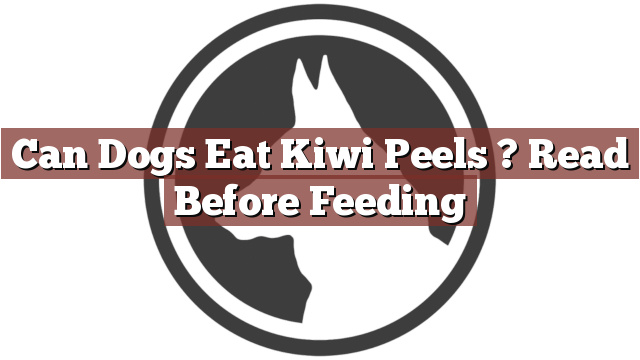Understanding Your Dog’s Dietary Needs
As responsible pet owners, it is crucial for us to understand the dietary needs of our dogs. While dogs are primarily carnivorous, they can also benefit from certain fruits and vegetables as part of a balanced diet. However, not all human foods are safe for dogs to consume. It is important to be aware of what foods are safe and beneficial for our furry friends and what foods can be harmful. One such fruit that often raises questions is the kiwi fruit.
Can Dogs Eat Kiwi Peels? Read Before Feeding
Can dogs eat kiwi peels? It is a common question among dog owners. The answer, however, is no. Kiwi peels are generally not suitable for dogs to eat. Although the flesh of the kiwi fruit is safe for dogs and can provide certain health benefits, the peel can be difficult for them to digest. The furry exterior of the kiwi peel can cause gastrointestinal distress and may potentially lead to an obstruction in the intestines. Therefore, it is best to remove the peel before offering kiwi to your dog.
Pros and Cons of Feeding Kiwi Peels to Dogs
While the peel of a kiwi is not recommended for dogs, there are still some benefits to feeding them the flesh of the fruit in moderation. Kiwis are a great source of vitamins C and E, as well as potassium and fiber. These nutrients can support your dog’s immune system, promote healthy skin and coat, and aid in digestion. However, it is important to remember that moderation is key. Too much kiwi can cause digestive upset in dogs, so it should only be given as an occasional treat and in small amounts.
On the other hand, the cons of feeding kiwi peels to dogs outweigh any potential benefits. The furry texture of the peel can irritate their digestive system and even lead to choking or intestinal blockage. Additionally, some dogs may have an allergic reaction to kiwi, which can cause symptoms such as itching, vomiting, or diarrhea. If you notice any adverse reactions after feeding your dog kiwi, it is best to consult with your veterinarian.
Conclusion
In conclusion, it is important to be mindful of what foods we offer our dogs, and kiwi peels are not suitable for their consumption. While the flesh of the kiwi fruit can provide some health benefits in moderation, the peel can be difficult for dogs to digest and may pose a risk of gastrointestinal issues or obstruction. If you want to treat your dog to some kiwi, make sure to remove the peel and only offer small amounts. As always, if you have any concerns or questions regarding your dog’s diet, it is best to consult with your veterinarian for personalized advice.
Thank you for taking the time to read through our exploration of [page_title]. As every dog lover knows, our furry friends have unique dietary needs and responses, often varying from one canine to another. This is why it's paramount to approach any changes in their diet with caution and knowledge.
Before introducing any new treats or making alterations to your dog's diet based on our insights, it's crucial to consult with a veterinarian about [page_title]. Their expertise ensures that the choices you make are well-suited to your particular pet's health and well-being.
Even seemingly harmless foods can sometimes lead to allergic reactions or digestive issues, which is why monitoring your dog after introducing any new food item is essential.
The content provided here on [page_title] is crafted with care, thorough research, and a genuine love for dogs. Nevertheless, it serves as a general guideline and should not be considered a substitute for professional veterinary advice.
Always prioritize the expert insights of your veterinarian, and remember that the health and happiness of your furry companion come first.
May your journey with your pet continue to be filled with joy, love, and safe culinary adventures. Happy reading, and even happier snacking for your canine friend!

